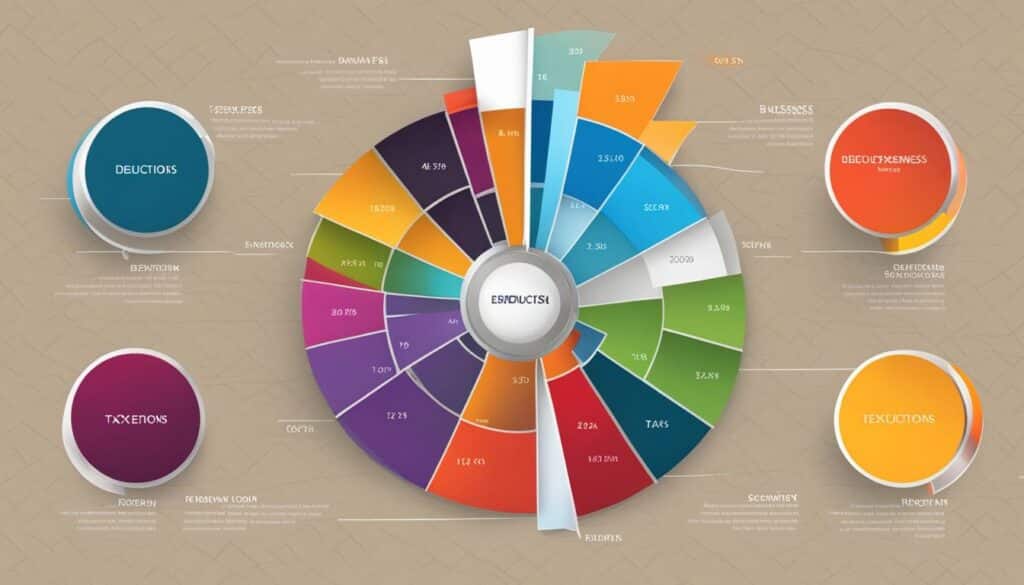As an independent contractor, it’s important to keep accurate records of your financial transactions and project-related activities. Maintaining detailed records is crucial for successful project management and tax compliance. In this section, we will discuss the essential items that independent contractors should track for seamless record keeping and efficient project management.
Key Takeaways:
- Independent contractors need to keep track of their financial transactions for successful project management and tax compliance.
- Proper record keeping ensures accurate project-related expenses and income tracking.
- Organizing receipts and invoices is essential for accurate record keeping.
- Business-related mileage and travel expenses should be properly tracked and documented for tax purposes.
- A comprehensive client database is crucial for effective project management.
Understanding the legal obligations of independent contractors
Independent contractors are responsible for their own tax and financial records, as well as complying with a variety of legal obligations. These obligations can vary depending on the industry and type of work being performed, so it is essential for contractors to understand their unique legal requirements.
At a high level, independent contractors must adhere to various laws and regulations related to:
- Taxation
- Worker classification
- Licensing and permits
- Insurance
- Employment eligibility verification
- Discrimination and harassment prevention
It is important for contractors to stay up-to-date on changes to these regulations and to seek legal advice if necessary to ensure compliance. Failure to comply with legal obligations can result in costly penalties and legal action.
The IRS has specific guidelines for determining whether a worker is an independent contractor or an employee. It is important for contractors to review and understand these guidelines to avoid misclassification and related legal issues.
Another important legal consideration for independent contractors is the use of contracts and agreements with clients. Contracts should clearly outline the scope of work, payment terms, and other relevant details to protect both the contractor and the client.
It is also important for contractors to protect their intellectual property rights, including trademarks, patents, and copyrights. Seeking legal advice and registering necessary protections can help prevent infringement and legal disputes.
Understanding and complying with legal obligations is a crucial aspect of being a successful independent contractor. By staying informed and seeking legal advice when necessary, contractors can protect themselves and their businesses from costly penalties and legal action.
Tracking project-related expenses and income
Independent contractors need to keep track of all project-related expenses and income for accurate financial reporting and tax filings. Tracking expenses can be a daunting task, but it is crucial for maintaining healthy cash flow. Here are some best practices for tracking expenses and income:
Categorize Expenses
Organize all project-related expenses into categories to make it easier to track and report. Common expense categories for independent contractors include:
| Expense Category | Description |
|---|---|
| Office supplies | Pens, paper, notebooks, etc. |
| Equipment | Computers, printers, software, etc. |
| Travel expenses | Mileage, lodging, meals, etc. |
| Marketing and advertising | Business cards, brochures, website hosting, etc. |
| Contractor labor | Payments to other subcontractors or assistants. |
By categorizing expenses, it becomes easier to identify where money is being spent, and make informed decisions on future expenses.
Track Income
In addition to tracking expenses, tracking income is also crucial. Ensure payments from clients are properly recorded, including the date, amount, and project description. Including this information will help when invoicing clients and identifying potential discrepancies in payment.
Use Accounting Software
To make expense tracking and income recording more manageable, independent contractors can turn to accounting software. These software tools help manage finances, including expenses, invoices, and payments. Examples of popular accounting software include QuickBooks and FreshBooks.
By following these tips, independent contractors can better manage their project-related expenses and income tracking. Accurate tracking provides a clear picture of the financial health of the business, which is essential for planning and growth.
Organizing receipts and invoices
Keeping track of receipts and invoices is a critical aspect of accurate record keeping for independent contractors. Not only can it help with tax deductions, but it can also ensure that all project expenses are accounted for and billed to clients correctly.
One important tip for keeping receipts and invoices organized is to separate them by project. This can be done physically by using different folders or digitally by creating separate folders or labels within an email account.
Note: The image below shows an example of how separating project-related receipts can improve organization:
Another helpful tip for organizing receipts and invoices is to use digital tools, such as expense tracking software or apps. These tools can automatically categorize expenses and keep track of important details, such as dates, amounts, and payment methods.
It is also important to keep a record of all invoice information, such as the client name, project name, and payment due date. This can help with tracking payments and ensuring that all invoices are paid on time.
By following these tips and utilizing digital tools, independent contractors can ensure that their receipts and invoices are organized and easily accessible for tax purposes and project management.
Recording Business-Related Mileage and Travel Expenses
As an independent contractor, you may need to travel for business-related purposes, including meeting clients, attending industry events, or conducting on-site work. Keeping track of your travel expenses and mileage is essential for accurate financial record keeping and claiming deductions on your taxes.
Here are some best practices and tips for tracking your business-related travel expenses:
- Record all the details of your travels, including the date, destination, purpose, and mode of transportation.
- Keep track of all your receipts and invoices related to travel expenses, such as airfare, rental cars, lodging, and meals.
- If you use your personal vehicle for business purposes, keep a detailed log of the miles driven, the purpose of the trip, and the starting and ending point of your journey.
- Use a mileage tracking app or logbook to make recording your business-related travel easier and more efficient.
It’s important to note that only business-related travel expenses and mileage are tax-deductible. If you are combining business and personal travel, you can only claim the expenses related to the business portion of your trip.
By keeping accurate records of your business-related travel expenses and mileage, you can ensure that you are claiming the deductions you are entitled to and avoiding any potential audit issues with the IRS.

Maintaining a Comprehensive Client Database
A comprehensive client database is vital for independent contractors to manage their projects effectively. However, keeping track of client contact information can be overwhelming, especially as projects grow in size and complexity. Here are some best practices for maintaining an accurate client database:
- Collect client information: At the outset of a project, ensure that you collect all the necessary client information, including name, email address, phone number, and company name. Having all this information in one place can help you manage communication more efficiently.
- Use a CRM: Consider using a customer relationship management (CRM) system to manage your client database. A CRM system can help you keep track of client interactions, identify potential leads, and maintain a comprehensive record of all client activity.
- Organize your database: Regularly update your database to ensure that all the information is accurate and up-to-date. Organize your database in a way that makes sense for your business, such as by company name or project type.
- Secure your database: Client information is sensitive, and it is your responsibility to protect it from unauthorized access. Use secure methods of storing and transmitting client data to maintain confidentiality.
By following these best practices, independent contractors can maintain an accurate and comprehensive client database, which is essential for managing projects efficiently and building long-term relationships with clients.
Staying on top of project deadlines and milestones
Meeting project deadlines and milestones is vital for any independent contractor. Failure to deliver projects on time can lead to unhappy clients, loss of business, and damage to reputation.
One effective method for tracking deadlines and milestones is to create a comprehensive project management plan. This plan should include a detailed timeline with specific deadlines for each task and milestone.
- Identify project milestones: Begin by identifying the key milestones for the project. These could include the completion of specific tasks, the delivery of prototypes, or the submission of reports.
- Create a timeline: Once the milestones are identified, create a timeline that outlines when each milestone should be achieved.
- Add specific deadlines: Within the timeline, add specific deadlines for each task that lead to the completion of the milestones.
- Allocate resources: Ensure that the necessary resources are allocated to meet these deadlines. This could include time, money, and personnel.
While creating a project management plan can be time-consuming, it can greatly increase the chances of meeting project deadlines and milestones.
There are also several online tools and software that can assist contractors in tracking project deadlines and milestones. These tools can help contractors monitor progress, set reminders, and communicate with team members. Some popular project management tools include Asana, Trello, and Monday.com.
Regardless of the method used, it is important to regularly review the project management plan and make necessary adjustments. Unexpected delays and changes may arise, and it is important to stay flexible and adaptable to ensure the project stays on track.
Managing subcontractor and vendor contracts
Independent contractors often collaborate with subcontractors and vendors for project completion. To ensure smooth collaboration and avoid potential legal issues, it is crucial to maintain detailed records of all contracts and agreements.
Having a comprehensive list of all subcontractor and vendor contracts is essential for independent contractors. This list should include the name of the subcontractor or vendor, the scope of work or services provided, the payment rate or structure, and any other relevant details. This information can be tracked using a spreadsheet or a database management tool.
Additionally, independent contractors must stay on top of contract renewals and termination dates to avoid potential legal disputes. Maintaining a calendar of these dates can be helpful in keeping track of essential deadlines.
In the case of subcontractors, independent contractors should also keep track of any subcontractor agreements signed between the two parties. These agreements should specify the scope of work, payment terms, and obligations of the subcontractor, among other critical details.
| Important elements of a subcontractor agreement | Details |
|---|---|
| Scope of work | Describe the specific tasks the subcontractor will perform. |
| Payment terms | Specify how much and when the subcontractor will be paid. |
| Duration of the agreement | Specify the start and end dates of the subcontractor agreement. |
| Termination clauses | Outline the conditions under which the agreement can be terminated, including notice periods and any associated penalties. |
When working with vendors, it is essential to keep accurate records of all purchase orders and invoices. Purchasing orders should specify the item or service being purchased, the payment amount, and the delivery date, while invoices should match the purchase order and include payment information.
Confidentiality agreements may also be necessary when working with subcontractors or vendors. These agreements can protect sensitive information and ensure that subcontractors and vendors do not disclose any confidential information to unauthorized parties.
When it comes to managing subcontractor and vendor contracts, accurate record keeping is key. By keeping comprehensive records of all contracts and agreements, independent contractors can avoid potential legal issues and maintain successful collaborative relationships with subcontractors and vendors.
Tracking and Reporting Business Expenses for Tax Deductions
Independent contractors can take advantage of tax deductions on eligible business expenses to reduce their tax liability. However, it is essential to keep accurate records and report these expenses correctly to avoid any issues with the IRS.
Here are some tips for tracking and reporting your business expenses:
- Separate personal and business expenses: It is crucial to keep your personal expenses separate from your business expenses to accurately report your deductible expenses. Have a separate bank account and credit card for business-related expenses.
- Keep detailed records: Maintain receipts, invoices, and other documents that support your expenses. These records should include the date, amount, and purpose of the expense. Digital tools can be particularly helpful in organizing and tracking records.
- Identify deductible expenses: Review the IRS guidelines to determine which expenses are deductible. Common deductible expenses include office supplies, travel expenses, and professional development courses.
When reporting your expenses, you can choose to itemize or take the standard deduction. Itemizing your deductions may be beneficial if your total deductions exceed the standard deduction. However, keep in mind that itemizing requires additional record keeping and documentation.
Reporting your business expenses accurately can help you take advantage of deductions and reduce your tax liability. Consult with a tax professional to ensure that you are reporting your expenses correctly and taking full advantage of available deductions.

Utilizing technology for efficient record keeping
As an independent contractor, managing project-related financial transactions and records can be a daunting task. However, advances in technology have made record keeping much more manageable and efficient. Employing technology tools can help you streamline your record keeping and stay on top of your finances more easily.
Accounting software
Accounting software can be an excellent tool for independent contractors to keep track of their finances. These software programs allow you to automate financial transactions, manage invoices, and categorize expenses. This eliminates the need for manual bookkeeping, saving time and reducing the chances of human error. Some popular accounting software options for independent contractors include:
| Software | Features |
|---|---|
| QuickBooks | Invoice management, expense tracking, receipt capture, profit and loss statements, tax preparation |
| Wave | Invoice management, expense tracking, bank account connect, receipt capture, financial reports |
| Xero | Invoice management, expense tracking, receipt capture, project tracking, bank connections, financial reports |
Choosing the right accounting software depends on your specific needs and budget. However, with so many options available, it’s easy to find one that aligns with your requirements.
Cloud-based storage
Cloud storage platforms can provide significant benefits for independent contractors. By storing important documents and files in the cloud, you can access your business data from anywhere at any time. This flexibility can make it easier to share files with clients and team members, and collaborate on projects in real-time. Some popular cloud-based storage solutions include:
- Google Drive
- Dropbox
- OneDrive
Using cloud-based storage solutions can help you minimize the risk of data loss and ensure that you always have access to your files. It’s also an excellent way to back-up all of your important business data.
Expense management apps
Expense management apps can help independent contractors track their expenses in real-time. These apps allow you to upload receipts, categorize expenses, and create expense reports. Some popular expense management apps include:
- Expensify
- Concur Expense
- Zoho Expense
These apps can save time and make it easier for you to track your expenses, minimizing the risk of missing any transactions. You can also use these apps to set budgets and receive alerts when you reach your spending thresholds, allowing you to stay on top of your expenses and avoid overspending.
By using a combination of these technologies, you can take control of your record keeping and streamline your financial management processes. Using technology will allow you to save time and reduce the likelihood of errors, freeing you up to focus on your projects and clients.
Conclusion
Effective record keeping is critical for independent contractors to maintain financial stability and successfully manage their projects. From tracking project-related expenses and income to maintaining a comprehensive client database and managing subcontractor and vendor contracts, independent contractors face unique challenges that require meticulous attention to detail.
By understanding their legal obligations and following best practices for record keeping, independent contractors can minimize the risk of errors, reduce the burden of tax compliance, and streamline project management. Additionally, technology offers a range of tools and software to enhance efficiency and accuracy when it comes to financial logs and project management.
Stay Ahead of the Game
To stay ahead of the game and achieve long-term success, independent contractors must prioritize record keeping and project management. By consistently monitoring project deadlines and milestones, tracking business expenses for tax deductions, and organizing receipts and invoices, independent contractors can ensure they’re on top of their finances. Moreover, maintaining a client database and utilizing digital tools can lead to improved efficiency and increased profitability.
While it may seem daunting at first, effective record keeping can significantly benefit independent contractors in the long run. By following the best practices outlined in this article, contractors can achieve financial stability and success throughout their careers.
FAQ
What should an independent contractor keep track of?
Independent contractors should keep track of their project-related expenses, income, receipts, invoices, business mileage and travel expenses, client contact information, project deadlines and milestones, subcontractor and vendor contracts, and business expenses for tax deductions.
Why is it important for independent contractors to understand their legal obligations?
Understanding legal obligations helps independent contractors operate within the legal framework and avoid any potential legal issues. It ensures compliance with relevant laws and regulations.
How can independent contractors effectively track project-related expenses and income?
Independent contractors can track project-related expenses and income by maintaining detailed records, categorizing financial transactions, and utilizing accounting or project management software.
What are some tips for organizing receipts and invoices?
Some tips for organizing receipts and invoices include keeping them in separate folders or digital folders, labeling them with relevant information, and utilizing receipt management apps or software.
How should independent contractors track and document business-related mileage and travel expenses?
Independent contractors can track and document business-related mileage and travel expenses by using mileage tracking apps or logs, maintaining a travel expense log, and keeping supporting documentation such as receipts or invoices.
Why is maintaining a comprehensive client database important for independent contractors?
Maintaining a comprehensive client database helps independent contractors stay organized, manage client contact information efficiently, and provide better customer service.
What strategies can help independent contractors stay on top of project deadlines and milestones?
Independent contractors can stay on top of project deadlines and milestones by utilizing project management tools, setting reminders, creating detailed project timelines, and prioritizing tasks.
How can independent contractors effectively manage subcontractor and vendor contracts?
Independent contractors can effectively manage subcontractor and vendor contracts by keeping records of contracts and agreements, reviewing and updating contracts regularly, and maintaining open communication with subcontractors and vendors.
What expenses can independent contractors track and report for tax deductions?
Independent contractors can track and report business-related expenses such as office supplies, professional services, travel expenses, advertising costs, and equipment purchases for potential tax deductions. It is recommended to consult with a tax professional for specific eligibility.
How can independent contractors utilize technology for efficient record keeping?
Independent contractors can utilize technology by using accounting software, project management tools, receipt management apps, cloud storage, and digital document organization systems for efficient record keeping.
Why is effective contractor record keeping important for independent contractors?
Effective contractor record keeping helps independent contractors maintain financial stability, meet legal obligations, manage projects efficiently, and maximize tax deductions.



